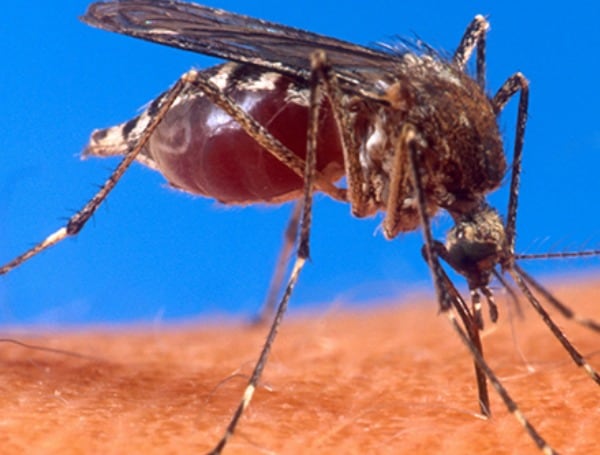Public health officials in the West Central Florida region are emphasizing the importance of preventive steps that Florida’s residents and visitors can take to protect themselves from mosquito-borne diseases such as the West Nile Virus.
County health departments in Citrus, Hardee, Hernando, Highlands, Hillsborough, Manatee, Pasco, Pinellas, Polk, and Sarasota are urging the public to remain diligent in taking preventative measures that include these “Drain and Cover” actions:
DRAIN standing water to stop mosquitoes from multiplying.
- Drain water from garbage cans, house gutters, buckets, pool covers, coolers, toys, flower pots or any other containers where sprinkler or rain water has collected.
- Discard old tires, drums, bottles, cans, pots and pans, broken appliances and other items that aren’t being used.
- Empty and clean birdbaths and pet’s water bowls at least once or twice a week.
- Protect boats and vehicles from rain with tarps that don’t accumulate water.
- Maintain swimming pools in good condition and appropriately chlorinated.
Empty plastic swimming pools when not in use.
COVER skin with clothing or repellent.
- Clothing – Wear shoes, socks, and long pants and long-sleeves. This type of protection may benecessary for people who must work in areas where mosquitoes are present.
- Repellent – Apply mosquito repellent to bare skin and clothing.
- Always use repellents according to the label. Repellents with DEET, picaridin, oil of lemon eucalyptus, para-menthane-diol, 2-undecanone and
IR3535 are effective.
- Use mosquito netting to protect children younger than 2 months old.
Tips on Repellent Use
- Always read label directions carefully for the approved usage before you apply a repellent. Some repellents are not suitable for children.
- Products with concentrations of up to 30 percent DEET (N, N-diethyl-m-toluamide) are generally recommended. Other U.S. Environmental Protection Agency-approved repellents contain picaridin, oil of lemon eucalyptus, para-menthane-diol, 2-undecanone or IR3535. These products are generally available at local pharmacies. Look for active ingredients to be listed on the product label.
- Apply insect repellent to exposed skin, or onto clothing, but not under clothing.
- In protecting children, read label instructions to be sure the repellent is age-appropriate. According to the Centers for Disease Control and Prevention (CDC), mosquito repellents containing oil of lemon eucalyptus or para-menthane-diol should not be used on children under the age of three years. DEET is not recommended on children younger than two months old.
- Avoid applying repellents to the hands of children. Adults should apply repellent first to their own hands and then transfer it to the child’s skin and clothing.
- If additional protection is necessary, apply a permethrin repellent directly to your clothing. Again, always follow the manufacturer’s directions.
COVER doors and windows with screens to keep mosquitoes out of your house.
- Repair broken screening on windows, doors, porches, and patios.
To determine which repellent is right for you, consider using the U.S. Environmental Protection gency’s search tool for skin-applied repellent products: http://cfpub.epa.gov/oppref/insect/#searchform.
DOH continues to conduct statewide surveillance for mosquito-borne illnesses, including West Nile Virus, Eastern Equine Encephalitis, St. Louis Encephalitis, Malaria and Dengue. For more information on mosquito-borne illnesses, visit DOH’s website at www.floridahealth.gov/diseases-and-conditions/mosquito-borne-diseases/index.html or call your local county health department.
Residents of Florida are encouraged to report dead birds via the website for Surveillance of Wild-bird Die-offs located at http://legacy.myfwc.com/bird/default.asp.
- Naked Boston Woman Drives Golf Cart Through Florida Police Standoff, Gets Arrested
- Florida Gov. DeSantis Expresses Concern About Biden Admin Cutting Supply Of Effective Antibody Treatments
- Florida Man Steals Pickup Truck, Crashes, Pretends To Grill On Strangers Porch
- “Gut Him” Florida Woman Pulls Knife On Man After Dispute Over Her Passing Gas At Dollar General
- Florida Man And Woman, In Colorful Simpsons Shirts, Arrested On Multiple Drug Charges
- “Snickers Satisfies” Florida Man Arrested After Armed Robbery Of A Snickers Bar At Wawa
- “Toll Booth Willy” Florida Man Arrested After ‘Showing It All’ At Seven Toll Booths
Support journalism by clicking here to our GoFundMe or sign up for our free newsletter by clicking here
Android Users, Click Here To Download The Free Press App And Never Miss A Story. It’s Free And Coming To Apple Users Soon.


